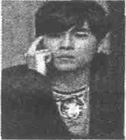题目内容
It was near Christmas during my first semester teaching a new school. I love my small special class more than any group I had taught in the past. They were hungry for knowledge and I was enjoying teaching.
Other teachers had told me that our children were from poor families and not to expect any child to bring a Christmas gift. In fact, I wasn’t expecting any gifts.
Imagine my surprise when every child brought me a gift on the day before our holiday break. First, I got a much-loved stuffed monkey from a shy girl. I was told, “He is my favorite, but I love you and I want him to be with you, Miss Taylor” How thrilled I was!
Next came a new set of Christmas tree lights that was “missing” from a mother's cupboard.
Finally, I came to one little boy’s gift which I had never received. It was an old, dirty and broken Christmas story book. Just then I wanted to express my happiness, I was interrupted(打断)by the giver, “And see, it is new! It still has the price tag.” "
When other children laughed at him, I stopped them and said, “Oh, books are good in that way. The story is always new if you have not read it before. Now, Let’s share one together.” Everyone listened quietly as I read the most wonderful Christmas story of my life.
I still keep those Christmas gifts, They always remind me of my lovely kids.
小题1:Why did the teacher like her small special class?
小题2: When did the children bring their teacher gifts?
小题3:Who sent a stuffed monkey to the teacher?
小题4:Was the Christmas story, book new?
小题5:How did the teacher feel when she got the presents?
Other teachers had told me that our children were from poor families and not to expect any child to bring a Christmas gift. In fact, I wasn’t expecting any gifts.
Imagine my surprise when every child brought me a gift on the day before our holiday break. First, I got a much-loved stuffed monkey from a shy girl. I was told, “He is my favorite, but I love you and I want him to be with you, Miss Taylor” How thrilled I was!
Next came a new set of Christmas tree lights that was “missing” from a mother's cupboard.
Finally, I came to one little boy’s gift which I had never received. It was an old, dirty and broken Christmas story book. Just then I wanted to express my happiness, I was interrupted(打断)by the giver, “And see, it is new! It still has the price tag.” "
When other children laughed at him, I stopped them and said, “Oh, books are good in that way. The story is always new if you have not read it before. Now, Let’s share one together.” Everyone listened quietly as I read the most wonderful Christmas story of my life.
I still keep those Christmas gifts, They always remind me of my lovely kids.
小题1:Why did the teacher like her small special class?
小题2: When did the children bring their teacher gifts?
小题3:Who sent a stuffed monkey to the teacher?
小题4:Was the Christmas story, book new?
小题5:How did the teacher feel when she got the presents?
小题1:Because they were hungry for knowledge./Because her class were hungry for knowledge /She liked her special class because they were hungry for knowledge.
小题2: On the day before their holiday break/ On the day before their holiday break, they brought their teacher gifts /They brought their teacher gifts on the day before their holiday break.
小题3:A shy girl. /A shy girl sent a stuffed monkey to the teacher.
小题4:No, it wasn’t.
小题5:Happy. /Thrilled. /Pleased. /Excited. /Moved. /....
She felt happy /thrilled/pleased/excited/moved/...when she got the presents.
When she got the presents, she felt happy/thrilled/pleased/excited/moved/….
略

练习册系列答案
相关题目
 Have you seen the videos on TV? Do you wear large T-skirts and baggy jeans? Or have you heard someone rap(说唱)? Hip-Hop is very
Have you seen the videos on TV? Do you wear large T-skirts and baggy jeans? Or have you heard someone rap(说唱)? Hip-Hop is very